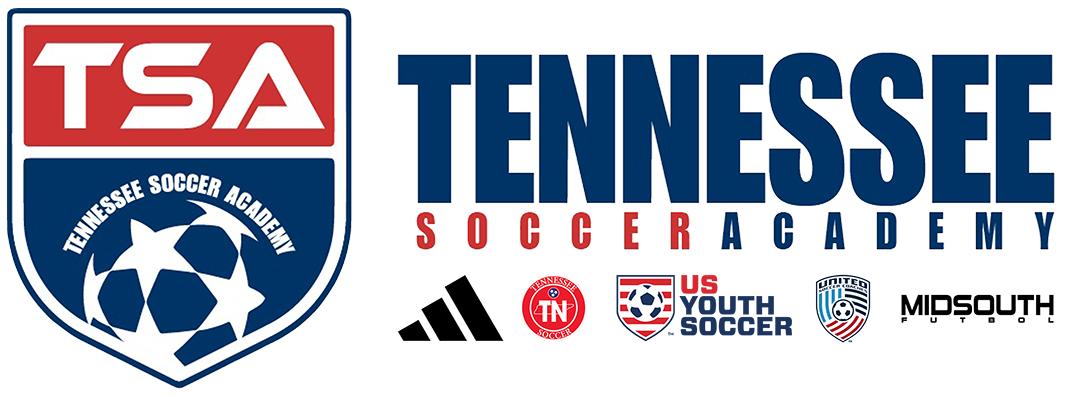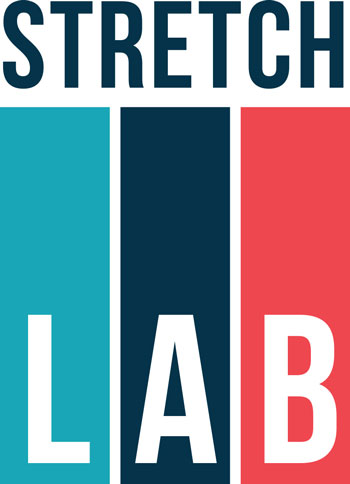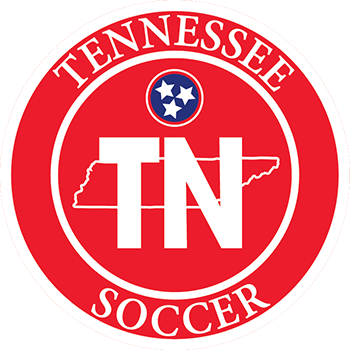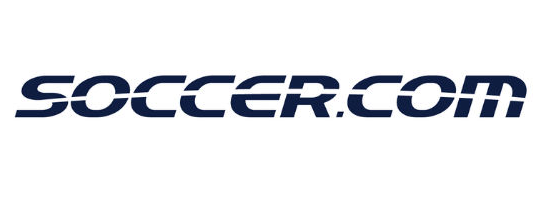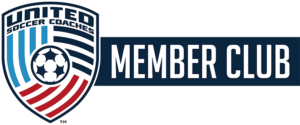Portions of this Code of Conduct have been adapted from the US Youth Soccer Association Code of Conduct and Tennessee State Soccer Association and will be in effect for all Tennessee Soccer Academy activities.
TSA Code of Conduct
ZERO TOLERANCE FOR ABUSE
Tennessee Soccer Academy “TSA” has a zero-tolerance for abuse in all youth soccer teams, programs, or activities. It is the responsibility of every coach and volunteer to participate in the effort to create a safe environment for all soccer participants.
Definitions
TSA ACTIVITY
“TSA Activity” includes State Associations and their registered members registered through their State Association. US Youth Soccer activities include but are not limited to, the National Championship Series (State, Regional, and National), National President Cup Series (State, Regional, and National), TOPSoccer, Programs, Soccer Across America Programs as well as regional competitions/leagues, National League, Olympic Development Programs and State Association soccer-related activities that qualify any coach, assistant coach, team training, team manager, referee, league president, league delegate, labor employee, or any other individual over the age of 18 seeking affiliation with the State Association or affiliated leagues within the State Association who has direct or indirect contact or influence on a youth player who seeks risk management certification within the State Association shall qualify as an activity.
1. Reporting Abuse or Suspicions of Abuse
REPORTING RESPONSIBILITIES
Given United States Youth Soccer’s zero tolerance for abuse, TSA encourages a culture of communication regarding matters that place athletes at risk. TSA supports and encourages a culture of communication related to abuse or suspected abuse of athletes. If you see or suspect inappropriate interaction with or between athletes, it is your responsibility to report the inappropriate interaction to a coach, supervisor, team official, league official, Risk Management Chair for TSA, or other designated state TSA representative. Because sexual abusers ‘groom’ athletes for abuse, it is possible that a coach or volunteer may witness behavior intended to ‘groom’ a child for sexual abuse. Coaches and volunteers are asked to report ‘grooming’ behavior, any policy violations, or any suspicious behaviors to a supervisor, team official, league official, Risk Management Chair for TSA, or other designated TSA representative. All reports of inappropriate behaviors or suspicions of abuse will be taken seriously and will be reported, in accordance with this Code of Conduct and state law, to law enforcement, Child Protective Services, or other appropriate agency.
2. HOW TO REPORT SUSPECTED CHILD ABUSE OR NEGLECT
Who is required to report child abuse?
All TSA staff, coaches, and any other adults who are authorized to interact with minor athletes at a facility under the jurisdiction of TSA MUST REPORT any suspected child abuse/neglect, including sexual abuse, WITHIN 24 HOURS of being made aware of the suspected abuse. Failure to report suspected child abuse is subject to criminal penalties.
What is required?
All individuals who are required to report must report suspected child abuse to EACH AND EVERY entity listed below:
1) Local Law Enforcement:
- Shelby County Sheriff’s Office: 901-379-7625
2) Tennessee Child Abuse Hotline: 1-877-237-0004
www.memphiscac.org/report-abuse/
3) Tennessee Soccer Academy Director:
- Sean Andre: 901-603-1119 / sean@tnocceracademy.com
4) Tennessee State Soccer Association Risk Manager:
- Hans Hobson – hhobson@tnsoccer.org / (615) 590-2200
5) U.S. Soccer: a. U.S. Soccer Integrity Hotline Number – (312) 528- 7004 b. U.S. Soccer Integrity Hotline website – https://www.ussoccer.com/integrity-hotline
6) U.S. Center for SafeSport: https://www.safesport.org/report-a-concern
3. ENFORCEMENT OF POLICIES
Coaches and volunteers who supervise other leaders are charged with the diligent enforcement of all athlete safety policies contained in this Code of Conduct. A violation of these policies can be grounds for immediate dismissal from TSA Activities. Final decisions related to policy violations will be the responsibility of TSA and/or the state association’s Risk Management Chair or designated state soccer association representative.
4. REPORTING VIOLATION OF POLICY
In order to maintain a safe environment for athletes, coaches, and volunteers must be aware of their individual responsibility to report any questionable circumstance, observation, act, omission, or situation that is a violation of these policies. All questions or concerns related to abuse should be directed to a supervisor, team official, league official, Risk Management Chair for TSA, or other designated TSA representative.
5. CONSEQUENCES OF VIOLATION
Any person accused of committing a prohibited act or any act considered to be harmful to a child will be immediately suspended from all TSA activities. This suspension will continue during any investigation by law enforcement or child protective agencies. Any person found to have committed a prohibited act may be prohibited from any future TSA Activity. Failure to report a prohibited act as designated in this policy is a violation of this policy and grounds for dismissal or removal. Coaches or volunteers who fail to report a prohibited act may be restricted from participation in any TSA Activity.
6. REPORTING SUSPICIONS OF ABUSE TO AUTHORITIES
TSA, and organizations and individuals related to TSA, do not investigate suspicions or allegations of physical or sexual abuse, or attempt to evaluate the credibility or validity of such allegations, as a condition of reporting suspicions or allegations to appropriate law enforcement authorities. TSA, and organizations and individuals affiliated with TSA, will comply with all laws requiring a person to make a report to the appropriate law enforcement agency if that person has cause to believe a child’s physical or mental health or welfare has been or may be adversely affected by abuse or neglect. If a coach or volunteer has cause to believe a child’s physical or mental health or welfare has been or may be adversely affected by abuse or neglect, that coach or volunteer can make a report directly to the appropriate reporting authorities or may report to a supervisor, team official, league official, Risk Management Chair for TSA, or other designated TSA representative who in turn will report the abuse or neglect. In the event relevant state law requires the individual with the cause to believe that a child may have been abused or neglected to report rather than delegate the responsibility, the individual will comply with the applicable reporting laws. When a report is made, the state association Risk Management Chair or designated state soccer association representative will be notified as soon as possible. In no way does any provision in this policy discourages any coach or volunteer from reporting a suspicion of abuse or neglect to the appropriate authorities.
7. RESPONSE TO REPORT OF ABUSE
When a report of abuse or neglect occurs, team or league representatives will take the necessary and appropriate action to ensure a safe environment for the person at risk. TSA WILL NOT RETALIATE against anyone who reports an abuse issue.
8. Prohibited Substances and Activities
INTOXICANTS
Coaches and volunteers are prohibited from being under the influence of alcohol or any illegal drugs while participating in any TSA Activity. Coaches and volunteers are prohibited from providing alcohol or illegal drugs to minor athletes or any other program participant.
TOBACCO
TSA programs and activities are tobacco-free. TSA requires coaches and volunteers to refrain from the use or possession of tobacco products while in the presence of minor athletes or their parents. Coaches and volunteers are prohibited from providing tobacco products to minor athletes.
NUDITY
Coaches and volunteers that participate in TSA Activities should never be nude in the presence of minor athletes.
9. SEXUALLY ORIENTED CONVERSATIONS
Coaches and volunteers that participate in TSA Activities are prohibited from engaging in any sexually-oriented conversations with minor athletes. Coaches and volunteers are not permitted to discuss any inappropriate or explicit information about their own personal relationships, dating, or sexual activities with any minor athlete in the program. This provision includes the use of cellular phones, text messages, e-mail, instant messaging, Facebook, and online chat rooms or other social media. See also Electronic Communication and Social Media, below.
10. POSSESSION OF SEXUALLY ORIENTED MATERIALS
Coaches and volunteers that participate in TSA Activities are prohibited from possessing any sexually oriented materials (magazines, videos, etc.) while in the presence of minor athletes.
11. Appropriate Physical Contact with Athletes
Appropriate physical contact between minor athletes and coaches or volunteers is a productive and inevitable part of the sport. Athletes are more likely to acquire advanced physical skills and enjoy their sport participation through appropriate physical contact. However, guidelines for appropriate physical contact reduce the potential for abuse and misconduct in athletics – as well as false allegations of abuse.
TSA, and organizations and individuals affiliated with TSA, acknowledge and adhere to the following principles and guidelines regarding physical contact with minor athletes.
Common Criteria for Appropriate Physical Contact
Physical contact with minor athletes – for safety, consolation, and celebration – has multiple criteria that make it both safe and appropriate. These include:
- The physical contact takes place in public;
- There is no potential for (or actual) physical or sexual intimacies during the physical contact;
- Physical contact is for the benefit of the athlete, not to meet an emotional or other needs of an adult.
Safety
The safety of minor athletes is paramount, and in many instances, athletic activity is made safer through appropriate physical contact. Examples include:
- Spotting an athlete so that he or she will not be injured by a fall or piece of equipment;
- Positioning an athlete’s body so that he or she more quickly acquires an athletic skill, gets a better sense of where his or her body is in space, or improves balance and coordination;
- Making athletes aware that he or she may be in harm’s way due to other practicing athletes or equipment use;
- Releasing muscle cramps.
Celebration
Sports are physical by definition. TSA recognizes that participants often express joy in participation, competition, achievement, and victory through physical acts. TSA encourages these public expressions of celebration, which include:
- Greeting gestures such as high-fives, fist bumps, and brief side hugs;
- Congratulatory gestures such as celebratory hugs, “jump-around” and pats on the back for any form of athletic or personal accomplishment.
Consolation
It may be appropriate to console an emotionally distressed athlete (e.g., an athlete who has been injured or has just lost a competition). Appropriate consolation includes, publicly:
- Embracing a crying athlete – in a public place or circumstance;
- Putting an arm around an athlete while verbally engaging them in an effort to calm them down (“side hugs”);
- Lifting a fallen athlete off the playing surface and “dusting them off ” to encourage them to continue competition.
12. PROHIBITED PHYSICAL CONTACT WITH ATHLETES
Prohibited forms of physical contact include, without limitation:
- Asking or having a minor athlete sit in the lap of a coach or volunteer;
- Lingering or repeated embrace of a minor athlete that goes beyond the criteria set forth for acceptable physical contact;
- Slapping, hitting, punching, kicking or any other physical contact meant to discipline, punish or achieve compliance from a minor athlete;
- “Cuddling” or maintaining prolonged physical contact of a minor athlete during any aspect of training, travel, or overnight stay;
- Playful, yet inappropriate contact that is not a part of regular training, (e.g., buttpats, tickling, or wrestling-type “horseplay”);
- Continued physical contact that makes a minor athlete obviously uncomfortable, whether expressed or not;
- Any contact that is contrary to a previously expressed personal desire by the minor athlete for decreased or no physical contact, where such decreased contact is feasible in a competitive training environment.
The above physical contact is prohibited between adult and minor athletes AND between minor athletes. Coaches and volunteers must model the behavior expected from minor athletes. The above forms of Prohibited Physical Contact will be immediately reported to a supervisor, team official, league official, Risk Management Chair for TSA, or other designated TSA representative. Some forms of physical contact may constitute physical or sexual abuse that must be reported to appropriate law enforcement authorities. When appropriate, the Prohibited Physical Contact will be reported to the appropriate law enforcement authority.
13. Misconduct
BULLYING
Bullying of any kind is unacceptable at any TSA Activity, and will not be tolerated. Bullying is counterproductive to team spirit and can be devastating to the victim. TSA is committed to providing a safe, caring, and friendly environment for all participants. If bullying does occur, incidents will be dealt with promptly and effectively. Anyone who is aware of bullying behavior is expected to tell a supervisor, team official, league official, Risk Management Chair for TSA, or other designated TSA representative.
Objectives of TSA’s Bullying Policy and Action Plan:
- To clearly communicate that TSA will not tolerate bullying in any form.
- To define bullying and give minor athletes, coaches, volunteers, and parents a suitable understanding of those behaviors that constitute ‘bullying’.
- To make it known to minor athletes, coaches, and volunteers that a policy and protocol exist should a bullying issue arise.
- To clearly communicate how to report bullying behavior.
- To communicate to minor athletes, coaches, volunteers, and parents that TSA takes bullying seriously, and will immediately investigate and address all reports of bullying.
HARASSMENT
Harassment is the repeated pattern of physical and/or non-physical behaviors that
- Are intended to cause fear, humiliation, or annoyance;
- Offend or degrade;
- Create a hostile environment;
- Reflect discriminatory bias in an attempt to establish dominance, superiority, or power over an individual athlete or group based on gender, race, ethnicity, culture, religion, or mental or physical disability;
- or act or conduct described as harassment under federal or state law;
Examples of harassment prohibited in TSA Activities include, without limitation:
Physical offenses. Behaviors that include
- Hitting, pushing, punching, beating, biting, striking, kicking, choking, or slapping a minor athlete or participant;
- Throwing at or hitting a minor athlete with objects including sporting equipment.
Non-physical offenses. Behaviors that include
- Making any negative or disparaging comments about an athlete including comments made about an athlete’s disability, religion, skin color, or ethnic traits;
- Displaying offensive materials, gestures, or symbols
- Withholding or reducing playing time to an athlete based on his or her disability, religion, skin color, or ethnic traits.
HAZING
Hazing is defined as coercing, requiring, forcing, or willfully tolerating any humiliating,
unwelcome or dangerous activity that serves as a condition for
- An athlete joining a group;
- An athlete being socially accepted by a group’s members; or
- Any act or conduct described as hazing under federal or state law.
Hazing does not include group or team activities that are meant to establish normative team behaviors or promote team cohesion.
Examples of hazing prohibited in TSA Activities include, without limitation:
- Requiring, forcing, or otherwise requiring an athlete to consume alcohol or illegal drugs;
- Tying, taping, or otherwise physically restraining an athlete;
- Sexual simulations or sexual acts of any nature;
- Sleep deprivation, otherwise unnecessary schedule disruption or the withholding of water and/or food;
- Social actions (e.g. grossly inappropriate or provocative clothing) or public displays (e.g. public nudity) that are illegal or meant to draw ridicule;
- Beating, paddling, or other forms of physical assault;
- Excessive training requirements are directed at a particular athlete or a group of athletes.
Activities that fit the definition of hazing are considered to be hazing regardless of an athlete’s willingness to cooperate or participate.
WILLFULLY TOLERATING MISCONDUCT
It is a violation of this Code of Conduct if a coach, volunteer, or participant knows of misconduct, but takes no action to intervene on behalf of the minor athlete(s). All forms of misconduct should be reported to a supervisor, team official, league official, Risk Management Chair for TSA, or other designated TSA representative.
PEER-TO-PEER SEXUAL ABUSE
Approximately 1/3 of all reported sexual abuse occurs at the hands of other children or minors. Coaches and volunteers have an obligation to report peer-to-peer sexual abuse in accord with state mandatory reporting requirements. Whether sexual interaction between athletes constitutes ‘sexual abuse’ depends on the existence of an aggressor and whether there is an imbalance of power between the parties (e.g., an age difference between the athletes, disparity in size, or the existence of a physical or intellectual disability). If you have concern that interaction between minor athletes may constitute sexual abuse, report the interaction to a supervisor, team official, league official, Risk Management Chair for TSA, or other designated TSA representative.
Peer-to-peer sexual abuse risk is highest:
- Any location that is less easily seen
- Any time minor athletes are unclothed or changing clothes, for any reason.
Due to this risk, coaches and volunteers will be aware of locations and facilities that are less easily seen or supervised. These locations and facilities vary per team and activity and can include practice and competition locations, restrooms, changing areas, locker rooms, dorms, and hotels. These areas will be supervised regularly by coaches and volunteers, where possible and appropriate.
14. Local and Team Travel
For some TSA Activities, travel is a standard aspect of a competitive season, and TSA provides the following policies to reduce the risk of abuse and misconduct. Adherence to these travel guidelines will increase athlete safety and improve the competitive experience while keeping travel a fun and enjoyable experience.
We distinguish between travel to training, practice, and local competition (“local travel”), and team travel involving a coordinated overnight stay (“team travel”).
Local Travel
Local travel occurs when the team does not sponsor, coordinate, or arrange for travel. For local travel, athletes or their parents/guardians are responsible for making all travel arrangements. In these instances, it is the responsibility of the athlete or their parents/guardians to ensure the person transporting the athlete maintains all safety and legal requirements, including, but not limited to, a valid driver’s license, proper insurance, a well-maintained vehicle, and compliance with all state laws.
In an effort to minimize one-on-one interactions, a coach or volunteer, who is not also acting as a parent, should not drive alone with an unrelated athlete and should drive with at least two other athletes or another adult at all times. In any case, where a coach or volunteer is involved in the athlete’s local travel, a parental release is required in advance.
Efforts must be made to ensure that a coach or volunteer is not alone with an athlete or participant, by, e.g., picking up athletes in groups. A coach or volunteer who is also an athlete’s guardian may provide shared transportation for any athlete(s). We encourage guardians to pick up their athlete first and drop off their athlete last in any shared or carpool travel arrangement. We also recommend completing a shared travel declaration form signed by the parent/guardian of any minor athlete who is being transported as part of such a carpool arrangement.
Team Travel
Team travel is overnight travel that occurs when the team sponsors, coordinates, or arranges for travel so that the team can compete locally, regionally, nationally, or internationally. Because of the greater distances, coaches, volunteers, and chaperones will often travel with athletes. However, no coach or volunteer will engage in team travel without the proper safety requirements in place, including a valid driver’s license, proper insurance, a well-maintained vehicle, and compliance with all state laws.
Team travel requires adequate supervision through coaches, volunteers, and other adult chaperones. For team travel, a team representative will book hotel accommodations and air travel in advance; the team representative will prioritize the choice of hotel accommodations that have rooms accessed from within the building, as opposed to street access (‘hotel’ vs ‘motel’ access). Athletes will share rooms, with 2-4 athletes assigned per room depending on accommodations. A team representative will notify hotel management regarding any special arrangements; for example, a team representative will request the hotel to block pay-per-view channels and will request an additional large room or suite such that athletes may socialize as a group.
Team meetings do not occur in hotel rooms (of the coach or an athlete); a team representative will reserve a separate space for adults and athletes to socialize.
To ensure the propriety of athletes and to protect coaches and volunteers, there will be no male athletes in the rooms of female athletes, and no female athletes in the rooms of male athletes (unless the athletes are siblings accompanied by a parent/guardian).
A coach shall not share a hotel room or other sleeping arrangements with an athlete unless the coach is the parent, guardian, sibling, or spouse of that particular athlete.
When visiting public places such as shopping malls, movie theaters, etc., athletes will stay in groups of no less than three persons. Athletes who are 12 years of age and under will be accompanied by an adult chaperone at all times.
Athletes are expected to remain with the team at all times during the trip. Athletes are not to leave the competition venue, the hotel, a restaurant, or any other place at which the team has gathered, without the knowledge and permission of the coach, volunteer, or chaperone.
Additional policies regarding TSA team travel:
- We strongly encourage players to travel together as a team when possible.
- If groups of players are traveling together, we encourage them to wear TSA shorts or pants and a TSA training shirt or warm-up jacket. All players should dress the same.
- Players should dress uniformly when departing for games.
- Using the swimming pool, Jacuzzi, exercise equipment or the like should be done with permission from the coach.
- Every person associated with Tennessee Soccer Academy should follow the rules of the hotel in which they are staying.
- Players should not run around, play soccer in the hotel hallways, or walk around barefoot or shirtless.
- If the tournament allows both male and female teams, casual association during free time will be allowed in public areas, but NO player should enter the rooms of players of the opposite sex.
- If a conference is necessary between a coach and an individual player, it must be done in the lobby of the hotel. Should a more private area be required, then it should be done with the presence of a manager, the player’s parents, or another adult.
We encourage family members who wish to stay in the team hotel to do so. If family members do not stay in the team hotel, we encourage all athletes to call parents and guardians regularly. A team representative will allow unscheduled calls to the athlete by a parent/guardian if requested by either the athlete or the parent/guardian.
TRAVEL NOTIFICATION
A team representative will provide reasonable advance notice before any team travels. Notice will include the dates, location, and duration of the competition. Travel notice will also include designated team hotels for overnight stays. A team representative will designate a contact person for team travel to help with travel details and provide information to parents. A team representative will post specific travel itineraries when they become available. These will include a more detailed, hour-by-hour itinerary as well as contact information for coaches and team travel chaperones.
COACH AND VOLUNTEER RESPONSIBILITIES
During team travel, coaches and volunteers will help athletes, fellow coaches, and volunteers adhere to policy guidelines, including travel policies and reporting policies. When not practicing, training, competing, or preparing for competition, coaches and volunteers will monitor the activities of athletes, fellow coaches, and volunteers during team travel.
Coaches and managers will:
- Prepare athletes for team travel and make athletes aware of all expectations.
- Familiarize themselves with all travel itineraries and schedules before the initiation of team travel;
- Conform to, and monitor others’ adherence, to the policies of the Code of Conduct and all other team policies during team travel;
- Encourage minor athletes to participate in regular communication with their parents/guardians;
- Help athletes to be on time for all team commitments (as possible);
- Assist with team travel logistical needs (as possible);
- Support chaperones and/or participate in the monitoring of athletes for adherence to curfew restrictions based on age and competition schedule, as listed in the travel itinerary;
- Ensure athletes are complying with hotel room restrictions based on gender or age requirements;
- Make certain that athletes are not alone in a hotel room with any adult apart from a family member, including coaches, volunteers, and chaperones;
- Refrain from using drugs or alcohol in the presence of minors or be under the influence of alcohol or drugs while performing any program or coaching duty;
- Immediately report any concerns about physical or sexual abuse, misconduct, or policy violations;
- Notify parents before taking any significant disciplinary action against a minor athlete if the athlete is traveling without his or her parents.
CHAPERONE RESPONSIBILITIES
Chaperones accompany team travel to ensure that the athletes, coaches, and volunteers adhere to schedules and guidelines, including the travel policy and all other relevant policies contained in the Code of Conduct. Each chaperone must undergo a background check screening with the appropriate State Association and follow all State Association and TSA Bylaws, Rules & Policies. (e.g. including Code of Conduct).
15. Electronic Communications & Social Media
All electronic communications between a coach and minor athlete must be professional in nature and for the purpose of communicating information about program activities only. As with any communication, the content of any electronic communication should be readily available to share with the athlete’s family. Any email, text, or similar communication will include at minimum another athlete, the team manager, the athlete’s parents, or guardian.
FACEBOOK, INSTAGRAM, TWITTER, SNAPCHAT, TIK TOK, AND SIMILAR SITES
Coaches or volunteers can only communicate with minor athletes under the age of 18 in a public forum (no private communication) only if the purpose of communicating the information is related to program activities. If a Facebook page is used, all coaches and parents must be included. Coaches and volunteers may not have any minor athletes under the age of 18 join their personal social media and can not join theirs. Coaches may not “follow” a minor athlete. Coaches cannot “retweet” athlete message posts. Coaches and volunteers are not permitted to “direct message” minor athletes through Twitter, Facebook, Instagram (or similar media). Coaches and volunteers are not permitted to post inappropriate off-color content or comment on inappropriate off-color posts. All posts, messages, texts, or media of any kind shared among athletes or between coach and athlete must be professional and public.
EMAIL AND SIMILAR ELECTRONIC COMMUNICATIONS
Athletes and coaches may use email to communicate if the athlete is at least 14 years of age. All email content between coach and athlete must be professional in nature and for the purpose of communicating information about program activities. The minor athlete’s parents MUST be copied on email communications.
TEXTING AND SIMILAR ELECTRONIC COMMUNICATIONS
Texts between a coach and an athlete must be in a group text format – the text MUST include another athlete, volunteer, parent, or another coach/assistant. All texts between a coach and an athlete must be professional and for the purpose of communicating information about team activities. No texting is allowed between a coach and an athlete before 8 am or after 8 pm unless there is a specific soccer activity that requires immediate attention.
ELECTRONIC IMAGERY
From time to time, digital photos, videos of practice or competition, and other publicly obtainable images of the minor athlete – individually or in groups – may be taken. These photos and/or videos may be used for athlete instruction (i.e. practice and game films), team videos, team websites, or offered to the athletes’ families. The use of photos/videos is permissible as long as the athlete or athletes are in public view and such imagery is both appropriate and in the best interest of the athlete and the program. Photo or video imagery must not be contrary to any rules or guidance outlined in this Code of Conduct.
REQUEST TO DISCONTINUE
The parent or guardian of a minor athlete may request in writing that their athlete not be contacted by coaches through any electronic communication; that request must be honored. Additionally, a parent or guardian of a minor athlete may request in writing that photographs or videography of their athlete not be posted on program or team websites, understanding that group photography or videography may render this impracticable; to the extent this request is practicable, it should be honored.
SOCIAL MEDIA MISCONDUCT
Social media and electronic communication can be used inappropriately. (e.g., emotional abuse, sexual abuse, bullying, harassment, and hazing). Such communication by coaches, volunteers, officials, administrators, parents, or other athletes will not be tolerated.
Electronic communication should not contain or relate to any of the following:
- Drugs or alcohol use;
- Sexually oriented conversation, sexually explicit language or sexual activity;
- An adult’s personal life, social activities, relationship or family issues, or personal problems; and
- Inappropriate or sexually explicit pictures.
Any communication concerning a minor athlete's personal life, social activities, relationships, family issues, or personal problems must be transparent, accessible, and Professional.
16. TSA SOCIAL MEDIA POLICY
Tennessee Soccer Academy (“TSA”) recognizes the importance of the Internet in shaping the public’s perception of our organization. TSA also recognizes the importance of our Board members, executive directors, sports coordinators, sports committee members, coaches, employees, and volunteers in leading and setting the tone of social media interactions in a manner that advances TSA’s mission and goals.
Applicability
This Social Media Policy applies to all Board members, executive directors, sports coordinators, sport committee members, coaches, employees, and volunteers (“TSA Members”). This Social Media Policy applies to all social media content posted by TSA Members in their professional and personal capacity to the extent such content is related to TSA.
GUIDELINES
All TSA Members shall abide by the following guidelines when using social media:
- Be positive and respectful, and always take the high road. When disagreeing with others’ opinions, remain appropriate and polite. If you find yourself in a situation online that is becoming antagonistic, ask the TSA Board of Directors or your sport coordinator for advice on how to disengage from the dialogue in a polite and respectful manner that reflects well on TSA.
- Do not post content that would harm TSA or damage TSA’s reputation. Remember that even while you are on your own personal time, you are a representative of TSA, and people may interpret your online postings or social interactions as though they were official TSA statements.
- Use good judgment when posting comments on any official TSA sites. Bear in mind that your comments can create liability for TSA. If you are unsure whether a comment is appropriate to post, either do not post it or obtain prior approval from the Board of Directors.
- Be smart about what you publish. Once something is posted, it exists online forever. Ask yourself, “would I want to see this published in the newspaper or posted on a billboard tomorrow or ten years from now?” If the answer is “no,” do not post.
- Encourage others to engage in positive interactions on social media. If you are concerned about any TSA Member’s use of social media, please bring your concerns to the attention of the TSA Executive Director.
- TSA members shall take full responsibility for their online profile, including their posts and any photos, videos or other recordings posted by others in which he/she appears.
- TSA members shall not degrade their opponents before, during, or after games.
- TSA members shall post only positive things about his/her teammates, coaches, opponents, and officials.
- Personally identifiable information (information, such as a name and date of birth and/or a street address which, when taken together, can identify a particular individual) should not be disclosed in any manner on official TSA social networking sites without the approval the TSA Executive Director or Board of Directors.
- TSA members shall not comment, like/dislike, friend, tag, or engage in any other means of contact through social media with any TSA minor athlete under the age of 18 unless the purpose of communicating the information is related to the program activities and is made public.
VIOLATIONS OF THE SOCIAL MEDIA POLICY
The TSA Board of Directors shall have the authority to monitor and enforce this Social Media Policy. The TSA Board of Directors, and any individual appointed by the Board of Directors, shall have the authority to remove any inappropriate or offensive comments from official TSA sites and to block any individual or organization from posting on any official TSA social media platform if they determine, in their sole discretion, that such removal or block is in the best interests of TSA.
The failure of any TSA Member to adhere to this Social Media Policy shall be considered a violation of the TSA Code of Conduct, and any TSA Member who fails to adhere to this Social Media Policy shall be subject to disciplinary action, up to and including termination of such individual’s involvement in TSA, in accordance with the TSA Disciplinary Procedures.
17. Parental Contact and Involvement
Parents of minor athletes will be contacted immediately, if their athlete becomes ill, injured, or has a severe disciplinary problem while participating in a TSA Activity.
18. Non-Discrimination Policy
TSA is committed to creating and maintaining a safe, nurturing, and fair environment for all its members. The organization’s primary emphasis is to provide the best opportunity for all of its members to maximize their full potential.
TSA does not discriminate against any member, player, coach, parent, or referee on the basis of race, color, national origin, age, disability, genetic information, sex, sexual orientation, gender identity, religion, political beliefs, marital status, parental status, or financial status.
19. Sporting Behavior
Any non-consensual physical contact, obscene or profane language or gesture, or other threatening language or conduct directed towards any player, official, parent, or TSA personnel having any connection to TSA is strictly prohibited.
Officials, coaches, and players will be treated with respect during all TSA events. While coaches are permitted to question an official regarding a call, coaches, parents, players, and spectators are not permitted to disparage, ridicule, or otherwise engage in threatening or harassing conduct toward an official, coach, or player. Only coaches or their designees are permitted to give direction to players during games and/or practices.
20. Supervision
TSA players shall not be left unsupervised. In addition, TSA players shall not be dropped off and left at any field before that player is under adult supervision. Coaches and staff will not leave any child unsupervised until the child is picked up. Accordingly, parents should be on time to pick up their children and notify the child’s coach if running late.
21. Physical Restraint
Physical restraint will be used only when necessary to protect the child or other children from harm. When physical restraint is administered, the situation must be immediately documented in writing to the Executive Director.
22. TSA Parent Code of Conduct
- Parents are expected to conduct themselves at all times in a manner that is in keeping with representing TSA Lakeland and not bring discredit upon the organization. Parents shall maintain the highest standard of conduct and good sportsmanship while representing TSA Lakeland.
- Parents are expected to be positive about the program and all players, parents, and coaches involved. Any negativity on the sideline, in the car, towards the team, coach, or other players will certainly affect your child’s ability to develop in our program. Any concerns about your child should be addressed to the program director.
- Parents shall refrain from using profanity during games or practices toward any coach, child, adult, or referee. This type of behavior is subject to disciplinary review and may lead to suspension or expulsion from the program.
- Parents will show respect toward referees, opposing players, coaches, and fans. They will not yell, scream, harass, abuse, or berate a referee, player, coach, or any other individual for any reason. This is unnecessary and simply embarrassing for all players and families trying to enjoy the game. This type of behavior is subject to disciplinary review and may lead to suspension or expulsion from the program. We ask that all parents set a good example for their children.
- Parents engaging in physical violence/conduct or threatening actions towards any player, parent, referee, or coach, will be immediately suspended, along with their child, from all organizational activities. A disciplinary report will be submitted for review and hearing to decide the next steps.
- No instructing your child from the sidelines. Your instruction may differ from the coach which can cause confusion and unneeded stress on your child. Your coach is following the Academy’s guidelines to help your child develop properly within our program while having fun.
- Try to motivate your child with positive words and actions, not material items. We feel offering money or prizes for scoring goals, working hard, etc., does not help develop the self-motivational skills needed to become a successful player on and off the field in the future. We also recognize a special treat here and there for a great day of soccer is always nice!
- Support your child unconditionally. Do not withdraw love when your child performs poorly. Trust us, they are trying to do their best.
- The bench area is for players and coaches only. Please respect this area. Parents should not stand by or behind the bench during games unless the coach has requested help.
- We ask that you do not confront your coach concerning an issue until 24 hours have passed after the game or practice. You may then feel free to contact the coach and discuss the issue. Our experience shows that issues are much easier to resolve after this 24-hour window. Any issue that needs immediate attention, may be addressed with the program director.
- Encourage your child to talk to the coach. “Taking responsibility” as a player – whether about missing a game or training session, things to improve on, etc., - is a huge part of developing skills on and off the field.
- Pass the reality test. If your child’s team loses but plays their best and is learning the game of soccer, help them see this as a win. Focus on the process, not the final score.
- The game should not be larger than your life. If your child’s performance produces strong emotions in you, just remember you are here for them. Keep your own goals and needs separate from your child’s. Your relationship with your child and the people around you is more important and will last longer than the game your child just played.
23. TSA Player Code of Conduct
- Players are expected to conduct themselves at all times in a manner that is in keeping with representing TSA Lakeland and not bring discredit upon the organization. Players shall maintain the highest standard of conduct and good sportsmanship.
- Players shall refrain from using profanity during games and practices.
- Players will show respect toward referees, opposing teams, and fans. They will not harass, abuse, or berate a referee for any reason.
- Players shall not participate in physical violence or threats thereof during games or practice.
- Attendance at training and games is important for development. Failure to attend may impact playing time and opportunities to improve and develop as a player.
- Players must bring cleats, running shoes, shin guards, water, and a properly inflated soccer ball to practice.
- Players are expected to show respect for all coaches and adhere to all instructions.
- Players shall be on time and prepared for all practices and games as outlined by their coach. All team practices, meetings, and activities are essential for player development; the coach must be notified in each instance in which a player is unable to attend a scheduled team activity.
- Players will play within the Spirit and Laws of the Game.
- Players must wear the approved club attire during practices and games.
- Playing time is not automatic, it is earned. The coach will determine playing time based on commitment, skill level, mentality, and attitude. Playing time may not be equal in a game or weekend.
- Players should strive constantly for high academic achievement and scholastic standing. Players need to know that to participate in high school athletics, TSSAA requirements state that five (5) subjects must be passed in the semester prior to player participation in any high school sport. Also, academic achievement will be the athlete's best ally or worst enemy when pursuing the college of his/her choice. Coaches may periodically ask players for a copy of his/her report cards.
- Player use of alcohol, tobacco, or drugs is strictly prohibited and will result in disciplinary action - which could include dismissal from the team.
Our Purpose
“Inspiring players and their love for the game”
Our Mission
To inspire through innovative and progressive programs driven by an unparalleled leadership team dedicated to the promotion of the players and community.
Our Core Values
Integrity, Inclusion, Empathy, Community
Benefits of Playing with Tennessee Soccer Academy
A positive, fun, and competitive environment where all players have the opportunity to develop an even greater love for the game.
An innovative and progressive curriculum designed for player development that is overseen by an experienced, professionally licensed team of leaders.
Access to specialized skills programming, seasonal clinics, summer and winter camps, and tournaments led by professionally licensed staff.
Beautiful facilities professionally maintained offering safe and high-quality environments for all of our players to enjoy the game.
